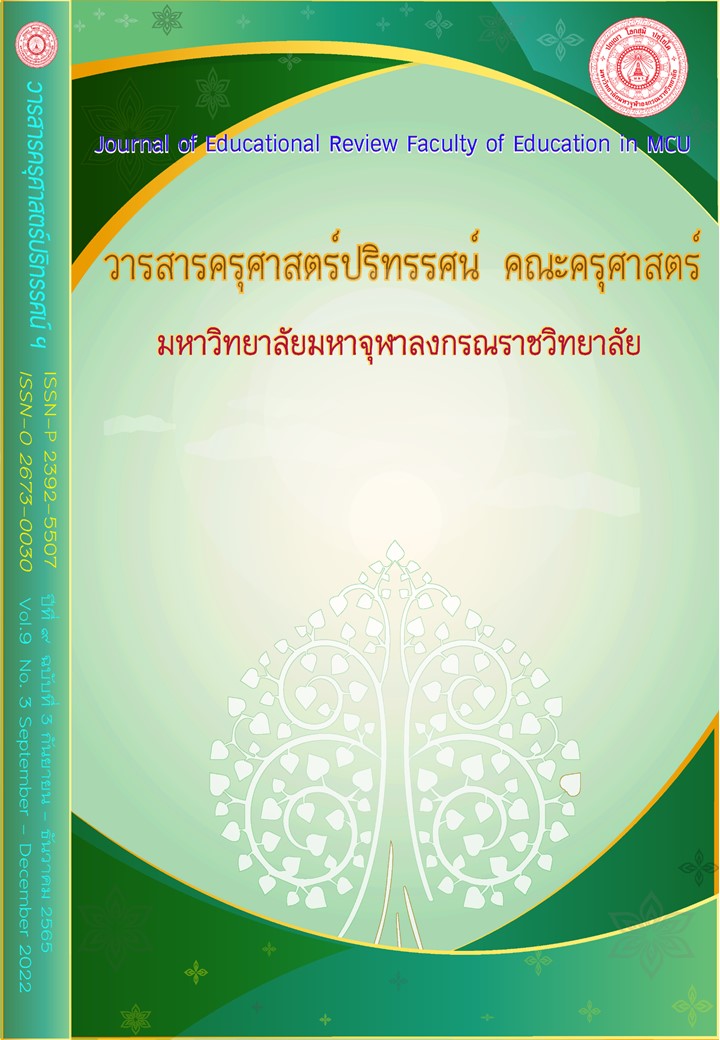DEVELOPMENT OF PERSONNEL MANAGEMENT ACCORDING TO BRAHMAVIHARA IV PRINCIPLES IN PRIMARY SCHOOLS UNDER THE PHRA NAKHON SI AYUTTHAYA PRIMARY EDUCATIONAL SERVICE AREA OFFICE
Main Article Content
Abstract
The objectives of this research article were 1) to study the conditions of personnel administration in primary schools, 2) to study methods for developing personnel administration according to Brahmavihara IV principles, and 3) to propose the development of personnel administration according to Brahmavihara IV principles in primary schools under the Phra Nakhon Si Ayutthaya Primary Educational Service Area Office. Mixed methods research was conducted, namely 1) quantitative research, a questionnaire of 346 teachers was used to analyze the data with statistics of percentage, mean, and standard deviation, and 2) qualitative research by interviewing 5 key informants, analyzing the data with content analysis. Results showed that 1) the conditions of personnel administration in primary schools under the Phra Nakhon Si Ayutthaya Primary Educational Service Area Office both in overall and individual aspects were at a high level. 2) Methods for developing personnel administration according to Brahmavihara IV principles in primary schools consisted the integration the 6 principles of personnel administration in primary schools with Brahmavihara IV principles to develop efficient personnel administration in primary schools. 3) The development of personnel administration according to Brahmavihara IV principles in primary schools under the Phra Nakhon Si Ayutthaya Primary Educational Service Area Office. It is the development of personnel management, namely, workforce planning, recruitment, personnel development, operational evaluation, personnel maintenance and the release of personnel from work. The integration with Brahmavihara IV principles consisted of 1) executives take care of work, give advice with kindness and create a good working atmosphere, 2) executives are attentive and should examine their colleagues and help solve problems, 3) executives sincere congratulations, and 4) executives are neutral and operate with fairness.
Article Details

This work is licensed under a Creative Commons Attribution-NonCommercial-NoDerivatives 4.0 International License.
ทัศนะและความคิดเห็นที่ปรากฏในบทความในวารสารฉบับนี้ถือเป็นความรับผิดชอบของผู้เขียนบทความนั้นเพียงผู้เดียว และไม่ถือเป็นทัศนะและความรับผิดชอบของกองบรรณาธิการ
กองบรรณาธิการขอสงวนสิทธิ์ในการคัดเลือกบทความลงตีพิมพ์และจะแจ้งให้เจ้าของบทความทราบหลังจากผู้ประเมินบทความตรวจอ่านบทความแล้ว
ต้นฉบับที่ได้รับการตีพิมพ์ในวารสารครุศาสตร์ปริทรรศน์ คณะครุศาสตร์ มหาวิทยาลัยมหาจุฬาลงกรณราชวิทยาลัย ถือเป็นกรรมสิทธิ์ของคณะครุศาสตร์ มหาวิทยาลัยมหาจุฬาลงกรณราชวิทยาลัย ห้ามนำข้อความทั้งหมดหรือบางส่วนไปพิมพ์ซ้ำ เว้นเสียแต่ว่าจะได้รับอนุญาตจากมหาวิทยาลัยฯ เป็นลายลักษณ์อักษร
References
ธานินท์ ศิลป์จารุ. (2551). การวิจัยและวิเคราะห์ข้อมูลทางสถิติด้วย spss. พิมพ์ครั้งที่ 9. กรุงเทพมหานคร: บิสซิเนสอาร์แอนด์ดี.
บุญชม ศรีสะอาด. (2535). การวิจัยเบื้องต้น. พิมพ์ครั้งที่ 5. กรุงเทพมหานคร: ชมรมเด็ก.
พระนิรันดร์ สุทฺธิเมตฺติโก. (2552). การบริหารงานบุคคลในโรงเรียนมัธยมศึกษา เขตบางกอกน้อย สำนักงานเขตพื้นที่การศึกษากรุงเทพมหานคร เขต 3. วิทยานิพนธ์พุทธศาสตรมหาบัณฑิต. มหาวิทยาลัยมหาจุฬาลงกรณราชวิทยาลัย.
พระพรหมคุณาภรณ์ (ป. อ. ปยุตฺโต). (2551). ธรรมนูญชีวิต. พิมพ์ครั้งที่ 12. กรุงเทพมหานคร: โรงพิมพ์การศาสนา.
พระมหาขวัญยืน สุทนฺโต. (2553). การศึกษาการบริหารงานบุคคลในสถานศึกษาขั้นพื้นฐานระดับ มัธยมศึกษาสังกัดสำนักงานเขตพื้นที่การศึกษาฉะเชิงเทรา เขต 1. วิทยานิพนธ์พุทธศาสตรมหาบัณฑิต. มหาวิทยาลัยมหาจุฬาลงกรณราชวิทยาลัย.
วิเชียร บุญกล้า. (2550). การศึกษาการใช้หลักพรหมวิหาร 4 ของผู้บริหารสถาศึกษาในสถานศึกษาขั้นพื้นฐานสังกัดสำนักงานเขตพื้นที่การศึกษาสุรินทร์ เขต 3. วิทยานิพนธ์ครุศาสตรมหาบัณฑิต. มหาวิทยาลัยราชภัฏสุรินทร์.
สมาน รังสิโยกฤษฎ์. (2520). ความรู้ทั่วไปเกี่ยวกับการบริหารงาน. พิมพ์ครั้งที่ 13. กรุงเทพมหานคร: สวัสดิการสำนักงาน ก.พ.
สุกัญญา แช่มช้อย. (2561). การบริหารสถานศึกษาในยุคดิจิทัล. กรุงเทพมหานคร: สำนักพิมพ์แห่งจุฬาลงกรณ์มหาวิทยาลัย.


